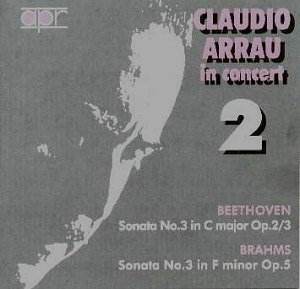These two live performances derive from recitals in
Prague, at the 1976 Spring Festival, and at Avery Fisher Hall in New
York on the occasion of Arrau’s 75th birthday in February
1978. The former was taped by Czech radio – rather close and up front
and inclined sometimes to shallowness (which accentuates a lightness
in bass sonorities) but is otherwise more than acceptable. The Brahms
however seems to have been recorded on a hand held cassette recorder
by an audience member and whilst Bryan Crimp has worked his accustomed
magic on the tape it still doesn’t make for comfortable listening. In
addition to the constrictions and extreme limitations of sound there
are also sniffs and audience coughs faithfully picked up and magnified.
As APR’s notes explain Arrau restored Beethoven’s Op
2/3 to his active repertoire in time for the 1974/75 season so the Prague
recital is one of the earlier fruits of its reappearance. He’d recorded
it for Philips in the 1960s but in this live performance there are commensurate
gains in depth and tension. He is in fine though not immaculate form
technically. The Allegro con brio has a strongly etched drive but it’s
the Adagio in which the greatest pleasure is to be found. Arrau’s plangency,
his command of sonority and his ability to bind themes are all to be
found here in a reading, which, if anything, surpasses his commercial
recording for sheer command. If the concluding Allegro assai seems to
hang fire slightly the scherzo lacks nothing in affectionate and kinetic
direction. Arrau recorded the Brahms Op 5 for Philips on 432302 in 1971.
Again, as in the case of his studio recording, he is on ever more energised
form. The opening movement may be inclined to gravity at a relatively
slow tempo but it’s fuelled by drama nevertheless with some leonine,
if occasionally occluded, gestures. Even at seventy-five Arrau was on
frequently regal form technically and in the slow movement one can once
more witness his mastery of compression and stillness unfolding. He
brings pathos but no hint of sentimentality to the movement and evinces
colouristic potential without sacrificing the noble gravity he has developed.
There is some untidiness at the end of the movement but the Scherzo
is full of boisterous spirit, more so than his more staid LP traversal.
The finale is again energised to a remarkable degree though he always
manages to bring out the lyricism embedded into the Allegro assai; those
combustible right hand runs are, if not immaculate, then staggeringly
confident. Altogether this is an uncommonly involved and involving performance
from Arrau, albeit one somewhat compromised by the sound problems earlier
mentioned. As such it falls into the category of "ancillary to
the central discography" I suppose but for those who imagine Arrau’s
last decade to have been marked solely by docility and lugubriousness,
the Brahms certainly will give one cause to reflect otherwise.
Jonathan Woolf
